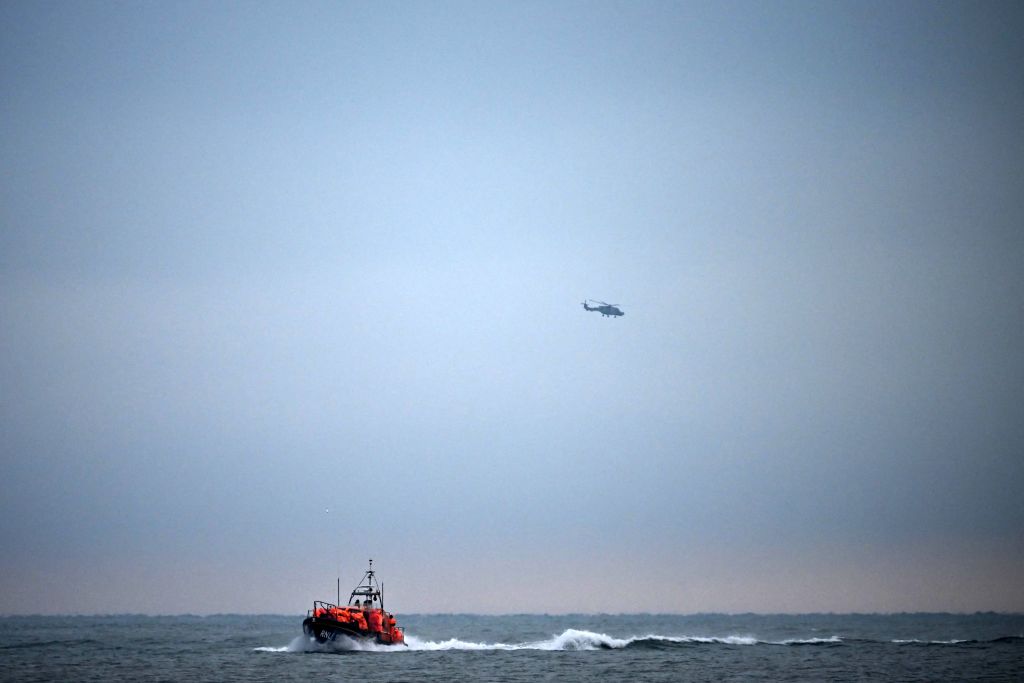When Rishi Sunak made ‘stop the boats’ one of his key pledges at the start of the year he mentioned the importance of being seen to ‘strain every sinew’ in pursuit of that goal.
This led some of us to suppose he had a fall-back position should he prove unable to stop all illegal immigration via dinghies across the Channel: that if he was seen to try everything but ended up being blocked by the liberal establishment then he might still be given credit by voters who would rally to his side in any general election fought on the issue.
The first string to his bow has already snapped. He has not stopped the boats. He cannot even now claim that he has substantially reduced them. When he went to Dover on June 5, Sunak argued that the fact that crossings were down 20 per cent on 2022 showed his policies were starting to work. But since then we have had a bumper month for crossings which are now only lagging slightly behind last year’s rate and closing fast. It is by no means unlikely that, given continued benign weather in July, small boat arrivals in 2023 will soon overtake those at a matching stage of 2022. At which point Sunak would presumably have to admit he was wrong to say his policies were working.
But it gets worse: the Prime Minister has just broken the second string to his bow by giving ground to those wishing to soften his Illegal Migration Bill. Since it had the guts ripped out of it in the House of Lords, with no fewer than 20 amendments being passed, Sunak has reportedly agreed to five being retained in a bid to keep internal Tory critics on board.
Lords amendments on the detention of child migrants, pregnant women, those claiming to be ‘modern slaves’ and those claiming to be otherwise trafficked against their will are set to be retained by ministers. Sunak’s promise of retrospective application of the new legislation is also set to be trimmed.
So he hasn’t stopped the boats and isn’t straining every sinew to do so either. And not only is his flagship legislation – which was designed to incorporate into law the principle that illegal arrivals cannot stay – having holes blasted in its sails, but the Rwanda removals plan is also sitting on bricks in a dry dock, having been declared unlawful by the Court of Appeal.
The business model of the people traffickers hasn’t been broken either, as evidenced by more than 1,000 migrants arriving via the Channel in two days over the weekend. Hotel space is full and the various barges and ex-military camps earmarked to take more migrants will only cope with a few weeks’ worth at current rates.
Having been so comprehensively boxed in by the Lords and the Court of Appeal, it is no wonder that government sources at the coal face on his issue are privately admitting: ‘We need a Plan B.’
Some want to revive a scheme to build a giant reception centre on the British overseas territory of Ascension Island which was ironically vetoed on cost grounds by Sunak’s Treasury a couple of years back. Bean-counters ruled then that a new desalination plant to guarantee fresh drinking water as well as other infrastructure improvements could involve spending several billion pounds. Yet on the current trajectory just the hotel costs of accommodating asylum seekers in the UK will hit £11 billion a year by 2026.
So here is what a Plan B to save Sunak’s skin could look like: the government requisitions a couple of old cruise liners which take it in turns to sit at anchor in international waters in the Channel somewhere south of the Isle of Wight. Instead of taking migrants from the dinghies to Dover, Border Force and the RNLI would take them mid-Channel to one of these liners. Once a liner was fully laden it would steam to Ascension and unload at a new ‘Port Refuge’ facility. A British promise to these migrants would involve indefinite food, clothing and shelter, as well as assistance finding them a permanent country of settlement and arranging onward transit or investigating whether their country of origin might be safe to return to after all. But on no account would any of the migrants, who after all would not have entered the UK at any point, be offered residency in Britain.
Such a system would create roughly the same disincentives for Channel-crossers as the hamstrung Rwanda scheme is designed to do. But it would have the crucial advantage of being fully under British government control. The optics of being seen to thwart illegal immigration in this manner and end the influx of thousands of undocumented young men would also be a massive political benefit to a Downing Street operation in desperate need of some good news.
The anticipated gnashing and wailing from refugee NGOs and ‘leftie’ lawyers would simply be grist to the mill. Keir Starmer would be pressed to say whether he would continue with the policy or pull the plug on Port Refuge, thereby reigniting the Channel crisis.
Outlandish? Possibly. But in the absence of another way forward Rishi Sunak needs to get those sinews straining again.







Comments